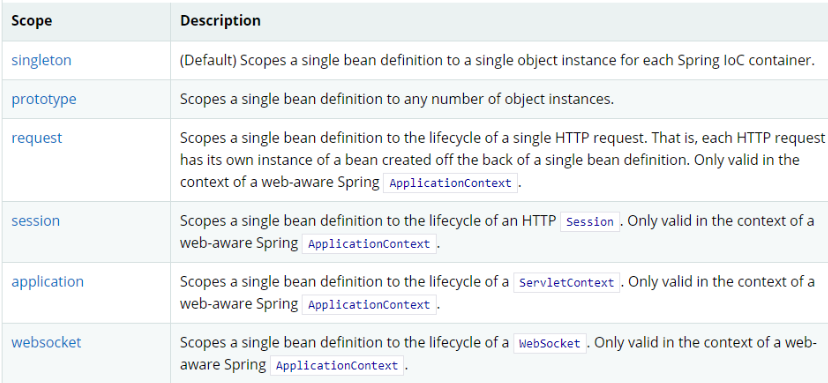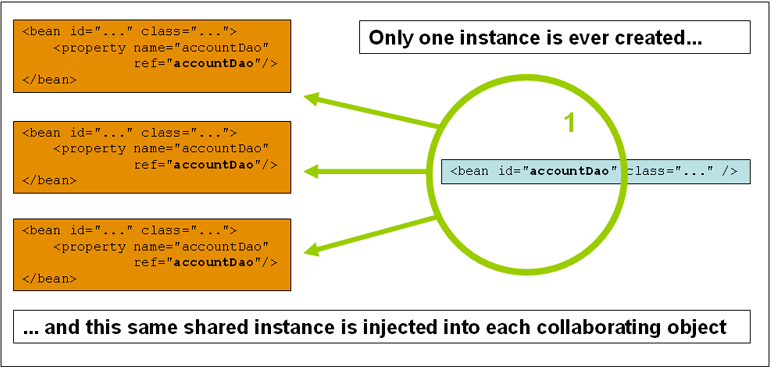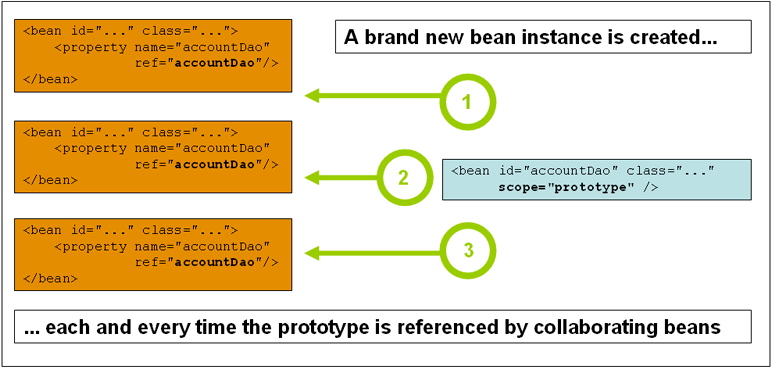Spring 依赖注入
6. 依赖注入
6.1 构造器注入
前面已经说过
6.2 set方式注入※
-
依赖注入:本质是set注入!
-
依赖:bean对象的创建依赖于容器
-
注入:bean对象中的所有属性,由容器来注入
-
环境搭建
-
复杂类型
package com.peng.pojo; public class Address { private String address; public String getAddress() { return address; } public void setAddress(String address) { this.address = address; } @Override public String toString() { return "Address{" + "address='" + address + '\'' + '}'; } } -
真实测试对象
package com.peng.pojo; import java.util.*; public class Student { private String name; private Address address; private String[] book; private List<String> hobbys; private Map<String,String> card; private Set<String> games; private String wife; private Properties info; public String getName() { return name; } public void setName(String name) { this.name = name; } public Address getAddress() { return address; } public void setAddress(Address address) { this.address = address; } public String[] getBook() { return book; } public void setBook(String[] book) { this.book = book; } public List<String> getHobbys() { return hobbys; } public void setHobbys(List<String> hobbys) { this.hobbys = hobbys; } public Map<String, String> getCard() { return card; } public void setCard(Map<String, String> card) { this.card = card; } public Set<String> getGames() { return games; } public void setGames(Set<String> games) { this.games = games; } public String getWife() { return wife; } public void setWife(String wife) { this.wife = wife; } public Properties getInfo() { return info; } public void setInfo(Properties info) { this.info = info; } @Override public String toString() { return "Student{" + "name='" + name + '\'' + ", address=" + address.toString() + ", book=" + Arrays.toString(book) + ", hobbys=" + hobbys + ", card=" + card + ", games=" + games + ", wife='" + wife + '\'' + ", info=" + info + '}'; } } -
beans.xml
<?xml version="1.0" encoding="UTF-8"?> <beans xmlns="http://www.springframework.org/schema/beans" xmlns:xsi="http://www.w3.org/2001/XMLSchema-instance" xsi:schemaLocation="http://www.springframework.org/schema/beans https://www.springframework.org/schema/beans/spring-beans.xsd"> <bean id="address" class="com.peng.pojo.Address"> <property name="address" value="葫芦岛"/> </bean> <bean id="student" class="com.peng.pojo.Student"> <!--1.普通值注入,value--> <property name="name" value="peng"/> <!--2.其他高级类型注入,bean注入,ref--> <property name="address" ref="address"/> <!--3.数组注入,ref--> <property name="book"> <array> <value>红楼梦</value> <value>西游记</value> <value>水浒传</value> <value>三国演义</value> </array> </property> <!--4.List--> <property name="hobbys"> <list> <value>吃饭</value> <value>睡觉</value> </list> </property> <!--5.Map--> <property name="card"> <map> <entry key="身份证" value="132151313213513553"/> <entry key="银行卡" value="165562612020201234"/> </map> </property> <!--6.Set--> <property name="games"> <set> <value>LOL</value> <value>CF</value> </set> </property> <!--7.null,空值注入--> <property name="wife"> <null/> </property> <!--8.Properties--> <property name="info"> <props> <prop key="学号">20200525</prop> <prop key="性别">男</prop> <prop key="生日">20010604</prop> </props> </property> </bean> </beans> -
测试类
import com.peng.pojo.Student; import org.springframework.context.ApplicationContext; import org.springframework.context.support.ClassPathXmlApplicationContext; public class MyTest { public static void main(String[] args) { ApplicationContext context = new ClassPathXmlApplicationContext("beans.xml"); Student student = (Student) context.getBean("student"); System.out.println(student.toString()); } } -
输出
Student{name='peng', address=Address{address='葫芦岛'}, book=[红楼梦, 西游记, 水浒传, 三国演义], hobbys=[吃饭, 睡觉], card={身份证=132151313213513553, 银行卡=165562612020201234}, games=[LOL, CF], wife='null', info={学号=20200525, 生日=20010604, 性别=男}}
-
6.3 其他方式
- p标签:
xmlns:p="http://www.springframework.org/schema/p" - c标签:
xmlns:c="http://www.springframework.org/schema/c"
User.java
package com.peng.pojo;
public class User {
private String name;
private int age;
public User() {
}
public User(String name, int age) {
this.name = name;
this.age = age;
}
public String getName() {
return name;
}
public void setName(String name) {
this.name = name;
}
public int getAge() {
return age;
}
public void setAge(int age) {
this.age = age;
}
@Override
public String toString() {
return "User{" +
"name='" + name + '\'' +
", age=" + age +
'}';
}
}
userbeans.xml
<?xml version="1.0" encoding="UTF-8"?>
<beans xmlns="http://www.springframework.org/schema/beans"
xmlns:xsi="http://www.w3.org/2001/XMLSchema-instance"
xmlns:p="http://www.springframework.org/schema/p"
xmlns:c="http://www.springframework.org/schema/c"
xsi:schemaLocation="http://www.springframework.org/schema/beans
https://www.springframework.org/schema/beans/spring-beans.xsd">
<!--p命名空间注入,可以直接注入属性的值,property-->
<bean id="user" class="com.peng.pojo.User" p:name="peng" p:age="18"/>
<!--c命名空间注入,通过构造器注入,constructor-->
<bean id="user2" class="com.peng.pojo.User" c:age="18" c:name="peng"/>
</beans>
测试类
import com.peng.pojo.User;
import org.junit.Test;
import org.springframework.context.ApplicationContext;
import org.springframework.context.support.ClassPathXmlApplicationContext;
public class MyTest {
public static void main(String[] args) {
test2();
test3();
}
@Test
public static void test2(){
ApplicationContext context = new ClassPathXmlApplicationContext("userbeans.xml");
User user = context.getBean("user",User.class);
System.out.println(user);
}
@Test
public static void test3(){
ApplicationContext context = new ClassPathXmlApplicationContext("userbeans.xml");
User user = context.getBean("user2",User.class);
System.out.println(user);
}
}
6.4 bean的作用域

- 单例模式 singleton


-
原型模式 prototype
每次从容器中get的时候,都会产生一个新对象

- 其余的 request、session、application,这些只能在web开发中使用到



 浙公网安备 33010602011771号
浙公网安备 33010602011771号